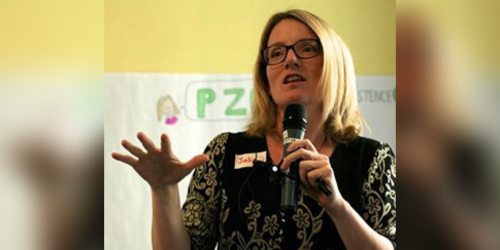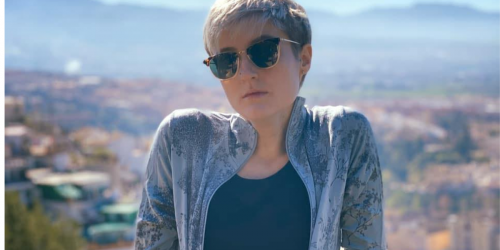
Lucy PhD Julia Hayes wins the Cambridge Creative Partnership competition to fund an animation of her research
Julia’s success reflects her ambition of communicating research in accessible ways
Halimatou Hima, Lucy PhD, talks about her commitment to international development issues
Choosing to embark on the PhD in Development Studies was the culmination of several years of questioning about development issues, particularly in my country Niger. In my teenage years, I had spent extensive time working as a community organiser and activist as part of the youth parliament. It was then that I began asking questions about why, for instance, girls in rural areas struggled to get access to education. As I deepened my interactions with communities, I came to realise that giving back effectively begins with a better understanding of the complex dynamics at play. Several years later, following my master’s degree and work in international development, the questions which took roots in Niger never left me. Most importantly, I yearned to understand development issues better and add my voice to policy discussions, bringing value and expertise, as an African woman, to the field. With the extensive experience that I had acquired on the ground and after a short but insightful engagement with development practice at the multilateral level, I wanted to find ways to bring an intellectual dimension to my experiences. Doing a PhD became evident.
Right before my PhD, I worked at the World Bank on the Global Delivery Initiative following my master’s in public policy at Harvard University. My work was very interesting and allowed me to engage directly with governments on projects ranging from agriculture to education and to conduct research on ongoing and past projects in order to draw lessons and capture institutional lessons that could inform future work and contribute to the library of knowledge. This experience has further strengthened my desire to do research. It was, it seemed, a unique opportunity to delve freely into some of the questions, plan my own work, and develop research questions based on my own interests. Growing up in Niger, I have always wondered, what made countries with seemingly similar ressources develop in different ways, and what made education such a powerful tool for change including value formation. In vue of where I come from, a PhD seemed out of reach; however, having met some amazing people have inspired me to pursue this journey.
A PhD is not necessarily essential for a career in international development. There are countless women and men who have made their mark in policy and development practice. However, I wanted to be able to base my understanding of development issues, gender and education on sound research. I do not think any other experience would have allowed me to develop the type of specific skills which I acquired in the process of doing a PhD. It is my hope that having done a PhD will give me an edge as a policymaker but also a more empathetic outlook on issues. When you do a PhD, you come to understand that your knowledge is limited and must be complemented with engaging with others, both on a human but also intellectual level.
The life ‘after PhD’ has already begun since 2020. My country, Niger, has been elected to the United Nations Security Council, and I was called to join the team in charge of our mandate. This is a dream come true opportunity, in many respects: it jointly allows me to serve my country and my continent (with Niger being one of the three elected African countries), but also to work in international development and diplomacy in the premiere body in charge of the maintenance of international peace and security. It is a privilege to be able to serve in this capacity, at this stage in my professional career, and to shape policies on a global scale.
Some of my inspirations for pursuing an academic journey were, in addition to my various experiences, people who have redefined their field of practice or research. I attribute my initial interest in pursuing research to my mentors Pr Ousseina Alidou, Pr Hassana Alidou, Pr Woolcock, Pr Filomina Steady, Dr Sidikou and Dr Santibanez: all of them have shown through their careers and remarkable contribution to humanity that a PhD can be not only a journey of discovery but also a tool to have a voice in research and policy.
My key motivations are the women and men, especially African women, who are pioneers in their field and who are opening doors and opportunities which only several years earlier seemed impossible. People like Dr Ngozi Okongo-Iweala and Dr Aichatou Mindaoudou have shown that women have a place in spaces where decisions with global consequences get discussed and ultimately taken. Looking at their journeys and that of many, I also understood that as a woman and an African from Niger, I may need to be twice as good to get half as far. If I was going to be able to make a difference, to be among those who bring critical perspectives in setting the global agenda on development broadly and education more specifically and be able to serve effectively, I needed to be a well rounded researcher, with an understanding of local dynamics, and a multidisciplinary experience in various contexts.
It is not easy to finish a PhD, and I understand why many leave along the journey - if I have continued it is because I have had the support of an extraordinary supervisor, Dr Shailaja Fennell, mentors in Cambridge such as Dr Pauline Essah, a cohort of supportive friends at the Centre of Development Studies, and a support network in Niger including Professor Tidjani Alou and my family who always cheer me on. As a member of the NEF community of scientists, I have come across scientists and researchers who are shifting the tide for research and policy positively, and this is truly inspiring and keeps me going. Also, being a woman from Niger where the proportion of girls who make it to secondary school let alone university remains extremely low, I want girls (and boys too) to look at my story and believe that it is possible, that you can begin in Arlit (or anywhere) and land a place in one of the best universities in the world.
I chose Lucy Cavendish because I loved what it stood for: an environment that supports women in their strive for excellence in education and research. As I have not visited Cambridge prior to beginning my PhD, I relied heavily on what students had to say in blogs and forums. Several talked about the small size of the community at Lucy, the charm of its garden, and how intellectually diverse the community was. Also, as a practicing Muslim woman, the idea of all female living spaces appealed to me.
One of the best parts was living in a place which became a home, a place where I was able to host friends for Ramadan, hold meetings for the 'Africa Together' conference, discuss around the 'African Women Indaba', and create memories that will last a lifetime. I loved that because of where I lived, my path crossed that of a Lucy alumna, Sylvia Lynn-Meaden, who had travelled and lived in Niger and Nigeria and who has greatly supported me in my journey at Cambridge. If there is truly one thing that makes Lucy special, it is the richness of the human experiences I have had: the feel of the college is friendly which is a solace in a challenging institution like Cambridge, and some of the most insightful conversations were impromptu discussions at the Plodge with John and his colleagues. I will cherish the opportunity to have grown in that environment but also have had the space to question and deconstruct what it meant to be a Black African woman in Cambridge.

Julia’s success reflects her ambition of communicating research in accessible ways

Lucy student and Gates Scholar Ellen Purdy’s interdisciplinary PhD combines chemistry and conservation science